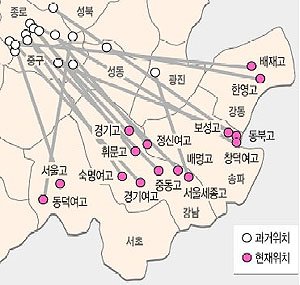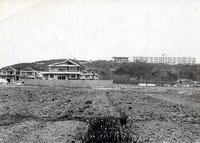Gangnam, Gangbuk, schools
 Hankyoreh has a story on 1970s' the school removal in connection with the recent revelation. It has some interesting pieces of info about the Gangnam development projects at the time. The Seoul authorities (who surely didn't act independently of the government) started curbing on the entertainment establishment in downtown ("within the four gates"), and also practically prohibited business and educational facility development there. Despite of this, people wouldn't move across the river, so the government had several high-ranking school removed to the southern side. (See the photograph above of the Gyeonggi High School removed to Gangnam in the 1970s.) Since the 1970s, of the 20 schools which have been removed from downtown 15 went to Gangnam-gu, Seocho-gu, Songpa-gu and Gangdong-gu, which form the Gangnam are in the social sence. (The picture to the right, linked from Hankyoreh shows the direction of school removal from the north to the south in Seoul.) Hankyoreh has a story on 1970s' the school removal in connection with the recent revelation. It has some interesting pieces of info about the Gangnam development projects at the time. The Seoul authorities (who surely didn't act independently of the government) started curbing on the entertainment establishment in downtown ("within the four gates"), and also practically prohibited business and educational facility development there. Despite of this, people wouldn't move across the river, so the government had several high-ranking school removed to the southern side. (See the photograph above of the Gyeonggi High School removed to Gangnam in the 1970s.) Since the 1970s, of the 20 schools which have been removed from downtown 15 went to Gangnam-gu, Seocho-gu, Songpa-gu and Gangdong-gu, which form the Gangnam are in the social sence. (The picture to the right, linked from Hankyoreh shows the direction of school removal from the north to the south in Seoul.)Hankyoreh also has an adjoining story, according to which many in the northern side of the river (Gangbuk) have unfairly long school trips due to the lack of high schools, and the areas in which the biggest proportion of highschoolers need to go to school in another gu are in Gangbuk. Ganbuk residents are filing petitions to build more schools to Gangbuk, but there's said to be a lack of adequate building space - except in Gangnam. Update. Hankyoreh keeps this issue up - no problem with that since it is an issue. Here's column by Kim Tong-ch'un (or Kim Dong-choon, don't know) about many people's fault of not being able to live in Gangnam. 이제 강남은 서울의 강남이 아니라 대한민국의 강남이 되었다. 강남에 살지 못하는 죄로 강남 외의 대한민국 모든 지역의 학생들은 강남으로 이사 가지 못하는 부모의 경제적 무능력을 한탄하게 되었다. 홍길동은 근본천생의 처지에 통한의 눈물을 흘리고 의적이 되었지만, 고교등급제를 바라보는 오늘의 학생들은 ‘사는 곳이 지위를 말해주는’ 이 현대판 신분제 아래서 장차 어떤 한을 품고 살아가게 될까? 기회의 평등이 보장되지 않은 상태에서 결과의 차이를 액면 그대로 인정하자는 주장은 자신의 의지와 무관하게 비강남 고교에 입학하여 결국 수시모집에 탈락한 부모와 학생들을 설득할 수 있을까? Two strong actually paradoxic currents: demands for equality in education and private, familial struggle to provide as good environment as possible for one's offspring. The demands for equality; the thinking that many in and around for example Hankyoreh represents wants to see as much equality of outcome as possible in addition to equality of opportunity and condition (see I've been reading some anthro stuff lately), while the demands for the freer student admission and freer choice sort of emphasize the equal chance to produce a difference. Categories at del.icio.us/hunjang: education ∙ Seoul ∙ urbanspace ∙ housing ∙ contemp.history |




Comments to note "Gangnam, Gangbuk, schools" (Comments to posts older than 14 days are moderated)
Write a Comment